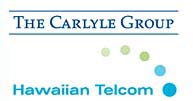$1.65 billion deal
for Verizon
in limbo
State consumer advocate
John Cole did not back a
condition that regulators
placed on the purchase
Hawaii's official consumer advocate said yesterday he decided against recommending a condition that the Carlyle Group put more cash into its purchase of Verizon Hawaii -- a condition regulators are now seeking -- because the companies likely would not agree to it.
 The state Public Utilities Commission issued a 2-1 decision Wednesday that includes a stipulation Carlyle increase its cash stake in the $1.65 billion transaction to 23.7 percent from 17.5 percent.
The state Public Utilities Commission issued a 2-1 decision Wednesday that includes a stipulation Carlyle increase its cash stake in the $1.65 billion transaction to 23.7 percent from 17.5 percent.
The state Division of Consumer Advocacy suggested several conditions for the deal to the commission, but did not recommend asking for more cash.
"The conditions that we suggested will adequately protect consumers," said John Cole, executive director of the Consumer Advocacy Division. "If we had asked for more (cash) up front like (the PUC did), the companies probably would not have agreed to the conditions that we had recommended in our statement of positions. The ones we did end up submitting to the PUC were ones they did agree they could live with."
The fate of the state's dominant local telephone company and its 1,700 employees has been on hold since the commission came out with the decision that ended the nine-month application process.
Nathan Hokama, local spokesman for the Carlyle Group, said company representatives are still studying the conditions imposed by the commission and don't have any comment.
Eric Rabe, the New York-based spokesman for parent company Verizon Communications Inc., said Verizon also is looking at the terms of the decision.
"Until we understand what's fully in this PUC order, Verizon certainly won't have any comment," Rabe said. "I don't know what Carlyle will do."
Rabe said it's too soon to talk about whether Verizon might put its Hawaii subsidiary back on the selling block if the deal falls through.
"I can't speculate about that possibility," he said. "I don't think anyone can at this point. We have to see how it plays out from here."
Industry observers said the commission's requirement that the Washington, D.C.-based Carlyle Group increase its cash stake in the highly leveraged deal likely will make the firm reassess whether it wants to go ahead with the acquisition.
Although Carlyle has about 10 days to ask the commission to reconsider its decision or provide clarification, observers say it's more likely the firm could go back to Verizon Communications and ask for a discounted deal so that Carlyle can still receive an acceptable financial return. Or, insiders say, Carlyle simply could walk away from the deal.
A New York-based telecom analyst, who asked for anonymity, said it's not surprising Carlyle appears to be having second thoughts.
"Obviously, the deal was cut at a particular valuation with a certain set of assumptions," he said.
The analyst also said he understands the commission's reservations about the proposed debt level of the deal.
"They're probably concerned about future levels of investment in networks -- services that the company can deliver to customers -- and their view could be that prior debt levels could limit future investment," he said.
Hawaiian Telcom, which is what the new company would be called, also had been planning to roll out a wireless division to compete with Verizon Wireless -- which wasn't included in the deal -- and other wireless competitors, Hokama said. The company has been advertising for wireless employees as well as people with financial expertise since Verizon Hawaii's financial functions are handled on the mainland.
In a similar case, the Oregon Public Utility Commission earlier this month unanimously denied the application by the Texas Pacific Group to buy Portland General Electric. The commission cited the large amount of debt to finance the purchase as the "primary source" of potential harm to PGE's customers because it could translate into higher future rates for customers.
Wayne Kimura, the lone Hawaii commissioner who dissented in Wednesday's decision, cited among his concerns the risk that that the transaction would impose new and substantial risks on ratepayers.
Carlyle earlier agreed, however, that it would not apply for a rate increase until 2009.
www.hawaii.gov/budget/puc/
Carlyle Group
www.thecarlylegroup.com/eng/
Verizon Communications Inc.
www.verizon.com/
[News] [Business] [Features] [Sports] [Editorial] [Do It Electric!]
[Classified Ads] [Search] [Subscribe] [Info] [Letter to Editor]
[Feedback]
